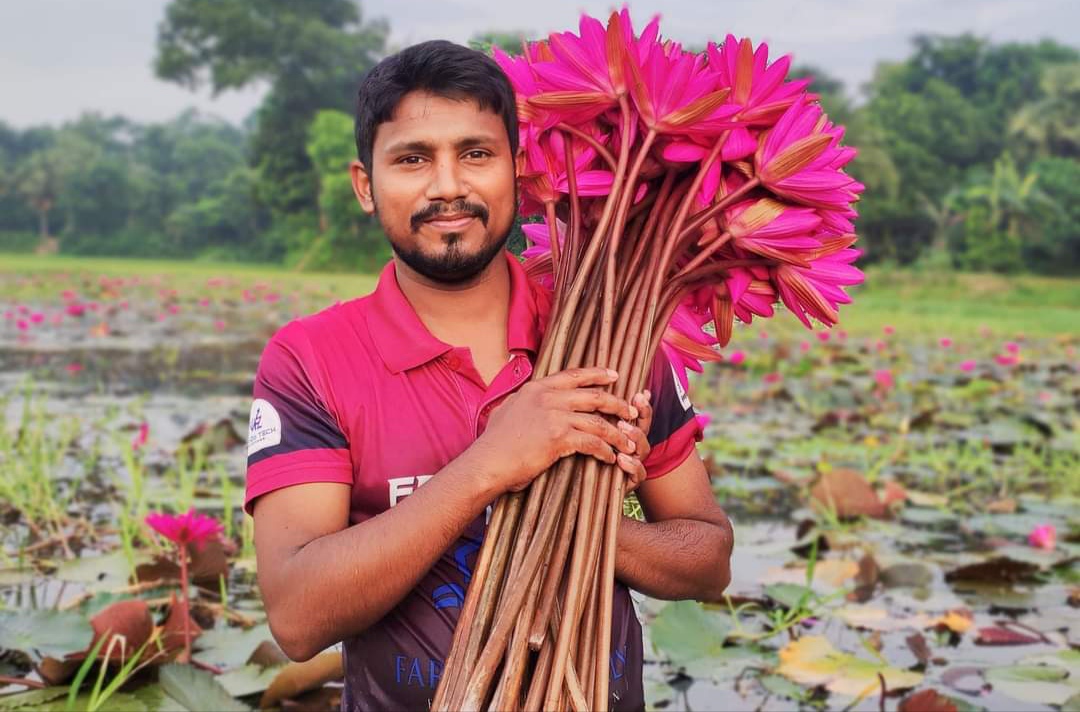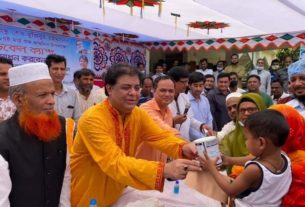
Our Correspondent, Gazipur: Someone is picking flowers. Someone is going to the boat with Baitha. Someone is looking around. Some people want to buy some fish from fishermen. All in all, a joyful atmosphere in Shapla Bill of Panchua village of Gazipur.
This bill of Panchua village is called Shapla bill by the people. There are two more bills nearby. Soro bill and Haro bill. Many people call the bill as Norite bill. But it is widely known as Shapla Bill.
A few months after the onset of monsoon, the bill starts blooming. And it ends in the middle of winter. In the early morning, you can see Shapla flowers. When the sun rises, the flowers slowly fade. People’s movement also decreases.
Bangtaz Tajuddin Ahmed’s holy land had to stop at Amraid Bazar in Rayed Union. After that a place called Jalpaitla. From there you have to go to Panchua village of Touk Union at the very end of the northern part of Kapasia. It is spread across Panchua village. The Norite Bill has 9 sections. The Norite Bill has been expanded to include 9 separate sections.
This small village is now the hub of the wanderlust. At this time of the year, those who live around Dhaka, come to enjoy the beauty of the bill. The reign of the red bee throughout the bill. The trees around the bill are fluttering. There is a cool breeze from the mango trees.
Nazmul Islam, a bank officer coming from Dhaka, said, “If I have time, I will come to Shapla Bill. I will go out with my friends to enjoy the nature. I have long wanted to visit Lal Shapla Bill. I will take photos with Shapla. That hope has been fulfilled. I know that such a beautiful place is so close. was not
Lohadi High School student Al Amin said, I am going home with many flowers with wings. Studying is not always enjoyable. Like many others, Asaduzzaman Ershad, a resident of Chala village in Bhuban, Sadar Union of Kapasia Upazila of Gazipur district, has come to visit today. The students of the local Bangataj Degree College have come. Naeem and Kishore. Innocent.
Siam, a law student of Bangabandhu Sheikh Mujibur Rahman University in Gopalganj, said that it is like the “red heaven” of Bengal in the heart of dark green. Although red, white and purple bees grow in the bill, red bees are more.
It is known that the local people pick flowers from the bill and sell them in the market. Hundreds of families in Panchua and Vikartek areas are making a living. Some people here depend on Bill’s Shapla flowers. Some make shapla, some catch fish from the bill, some make a living by selling fish in the market.
It is known that there is a lot of calcium in shapla. The amount of calcium in beets is seven times more than that of potatoes. Shapla is very useful for skin and blood dysentery. Its popularity is increasing day by day in cities as well as villages. The readily available beets are very beneficial for health.
If you want to explore the immense beauty of Shapla Bill, you can hire a small boat from the locals. You will feel complacent while floating on the bill. Various types of birds including bucks and fishes come and chirp among the bills.
Afrauza Sultana, head of Kapasia Upazila Best Institute, said, I have heard many stories about Shapla Bill from the students. Some say they have swam, some say they have seen flowers bloom and fade. Some say satisfaction.
Kapasia Upazila Chairman Advocate Amanat Hossain Khan said, efforts are being made to retain the beauty of the naturally developed Shapala Bill. Safety will be ensured for the winter tourists from every monsoon. Arrangements will be made so that women and children are not victims of accidents. Villagers’ cooperation is needed in this regard.




